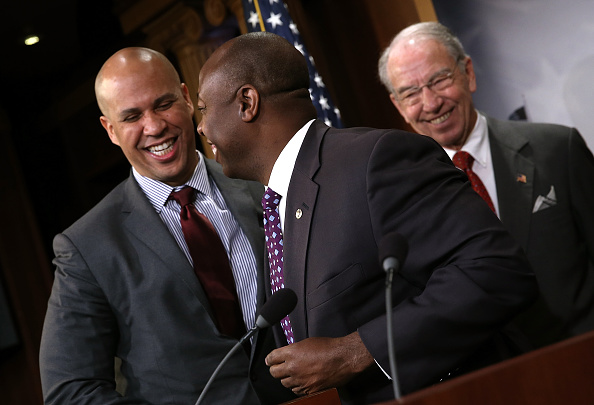
After months of negotiations, a bipartisan group of senators finally introduced a criminal-justice reform bill Thursday that advocates hail as the most comprehensive set of reforms in a generation.
Known as the Sentencing Reform and Corrections Act, the bill is designed to reduce mandatory minimum sentences for certain nonviolent drug offenders, allow deserving federal prisoners to shave time off their stints behind bars and give judges greater sentencing discretion, among other significant provisions.
“This is a historic turning point for the Senate, hopefully the Congress, and the country,” says Christine Leonard, executive director of the Coalition for Public Safety, a bipartisan array of advocacy groups that worked to muster support for the legislation. “It turns back the clock in terms of how we approach these issues legislatively.”
The package reins in some of the most draconian sentencing provisions that for a generation have sent America’s prison population soaring. It would roll back the “three strikes” law that requires mandatory life sentences without parole for a third drug or violent felony and narrow the scope of which prior convictions can trigger enhanced sentences. It retroactively applies a 2010 bill that reduced the disparity between crack and powder cocaine sentences—a change could allow an estimated 6,500 crack cocaine offenders to seek new sentences. It would give judges leeway to sentence low-level nonviolent drug offenders with minimal criminal histories below applicable mandatory minimums, and includes provisions that would help prisoners transition back into society.
The bill also introduces some significant juvenile justice reform proposals. It would curb the use of solitary confinement on young prisoners in federal facilities, allow young non-violent offenders who were tried in criminal court to have their records expunged, and offer parole eligibility to juveniles sentenced to life after they have served 20 years.
Read More: Will Congress Reform the Criminal Justice System?
Criminal-justice reform advocates celebrated the bipartisan proposal as a significant victory. “This bill isn’t the full repeal of mandatory minimum sentences we ultimately need,” said Julie Stewart, president of Families Against Mandatory Minimums, “but it is a substantial improvement over the status quo and will fix some of the worst injustices created by federal mandatory sentences.”
If it passes, the bill would be a triumph for President Obama, who has made criminal-justice reform one of the cornerstones of his second-term agenda. And it represents a rare burst of bipartisan harmony between advocacy groups that are more accustomed to working against one another, from conservatives like the Koch brothers to left-leaning groups like the American Civil Liberties Union. Such groups spent months collaborating, generating enough bipartisan momentum to push the package to fruition.
Relentless pressure from a convergence of interest groups helped push the senators to the table. Activists appealed to different senators for different reasons. For some conservatives, skyrocketing incarceration costs were a primary factor; for some liberals, the profound racial disparity in mandatory minimum sentencing was the galvanizing cause. And the nation’s newfound attention to the issue amid the Black Lives Matter movement that sprang out of the Ferguson riots played a role of its own.
The breadth of the bipartisan coalition that unveiled the Senate bill on Thurs spans the political spectrum. The group ranges from Tea Party senators like Utah’s Mike Lee to Vermont liberal Patrick Leahy, and includes influential members like Chuck Schumer of New York, the presumptive heir to Senate Democratic leader Harry Reid, and Senate Republican whip John Cornyn. The senators managed to merge a set of separate justice-reform bills over which many tandems have long toiled; Cornyn and Rhode Island Democrat Sheldon Whitehouse, for example, had been negotiating for some three years over a justice-reform package. The bill’s release comes on the heels of the “Safe, Accountable, Fair, and Effective”Act of 2015, which was introduced by a bipartisan coalition in the House of Representatives this summer.
“We are political odd couples,” said Dick Durbin of Illinois, the No. 2 Senate Democrat. “But we found common ground.”
Read More: Koch Brother Teams Up With Liberals on Criminal Justice Reform
The coalition overcame the skepticism of Senate Judiciary Chairman Chuck Grassley, an Iowa Republican who has long fought for tough mandatory minimum sentences. “What brought me along was the ability to look at more things than reduce minimums,” said Grassley, who noted some new mandatory minimums were created, including some that pertain to domestic violence and terrorism.
“This modest bill represents a change in direction after decades of policies that cost too much and strained the corrections system,” said Jason Pye, the director of justice reform at the conservative group FreedomWorks, which was part of the left-right coalition that helped muster grassroots support for the proposal.
The powerful cadre of lawmakers arrayed behind the bill bode well for its chances of passage. But neither a majority nor momentum guarantee success in a polarized legislature. The proposal will have to jockey for floor time with other pressing matters on a crowded congressional docket, and the window for passage may close quickly as the presidential campaign ramps up. “We need a sense of urgency to get these bills into markup and up for a vote ASAP,” says Van Jones, co-founder of the prison-reform group #cut50.
Despite the political challenges that lie ahead, this legislation represents a significant step forward.
“This is just monumental. There’s nothing draconian in this proposal, no hostage-style tradeoffs,” said Leonard. “That’s a game-changer moment for rational conversations around justice reform.”
Read Next: The Growing Republican Divide on Criminal Justice Reform
More Must-Reads from TIME
- Cybersecurity Experts Are Sounding the Alarm on DOGE
- Meet the 2025 Women of the Year
- The Harsh Truth About Disability Inclusion
- Why Do More Young Adults Have Cancer?
- Colman Domingo Leads With Radical Love
- How to Get Better at Doing Things Alone
- Michelle Zauner Stares Down the Darkness
Write to Alex Altman at alex_altman@timemagazine.com